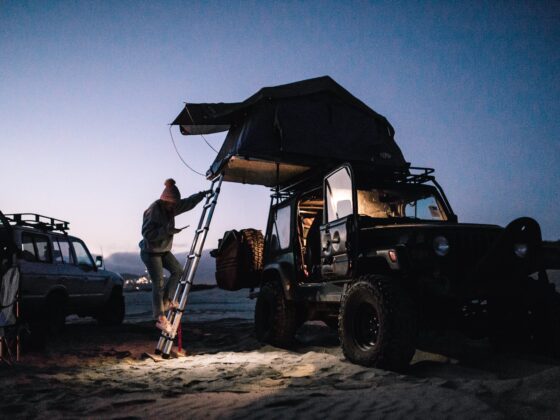Are you gearing up for a camping trip but unsure whether to rely on solar power or portable power? Making the right power station choice can make all the difference in ensuring a convenient and enjoyable camping experience.
This article will delve into the heated debate of solar power versus portable power for your camping needs. We will explore the pros and cons of each option, allowing you to make an informed decision that suits your specific requirements.
Solar power vs. portable power
Pros and cons of solar power for camping
Solar power is gaining popularity among outdoor enthusiasts for its environmentally friendly and sustainable characteristics. Harnessing the sun’s power, solar chargers, and panels can keep your devices fully charged, even off the grid.
One of the significant advantages of solar power is its unlimited energy source. As long as you have access to sunlight, you can generate power without relying on external fuel sources. This not only saves you money in the long run but also reduces your carbon footprint. Solar power is a clean energy solution that does not contribute to air or noise pollution, making it an excellent choice for eco-conscious campers.
On the flip side, solar power does have a few drawbacks. The primary concern is its dependence on sunlight. If you’re camping in cloudy or shaded areas, your solar panels may not be able to generate enough power to meet your needs. Additionally, solar panels and chargers can be bulky and require ample space for setup. This can be challenging if you have limited packing space or are hiking to your camping location.
Pros and cons of portable power for camping
Portable power options such as generators and the best power banks for camping offer convenience and versatility, providing reliable power whenever and wherever you need it.
One of the biggest advantages of portable power is its ability to generate electricity on demand. Whether you need to charge your phone, run a small appliance, or power your camping lights, portable power solutions can deliver the energy you require. These compact devices are designed for easy transportation and can fit into your backpack or camping gear without taking up too much space.
However, portable power solutions also come with their own set of disadvantages. The most notable drawback is the need for fuel or battery recharging. Generators, for example, require gasoline or propane to operate, which means you need to carry extra fuel with you. This can be inconvenient and potentially hazardous, especially when camping in remote areas. Power banks, while more environmentally friendly, have limited capacity and need to be recharged frequently.
Factors to consider when choosing between solar power and portable power
Several factors come into play when deciding between solar power and portable power for your camping needs. Considering these factors, you can determine which option is best for your camping adventures.
Energy needs and camping duration
First and foremost, assess your energy needs and the duration of your camping trip. How many devices do you need to charge? Are you planning on using power-hungry appliances such as refrigerators or air conditioners? Solar power may be more suitable for longer camping trips where you can rely on sunlight to recharge your devices. On the other hand, portable generators and power options may be more practical if you have high energy demands or are camping for a shorter duration.
Cost
Cost is another crucial factor to consider. Solar power solutions can be more expensive upfront, mainly due to the cost of solar panels and chargers. However, once you’ve made the initial investment, solar power is essentially free. On the other hand, portable power solutions may have a lower upfront cost, but you will need to factor in ongoing fuel or battery expenses. Consider your budget and the long-term cost implications before making a decision.
Environmental impact
Solar power is the clear winner if environmental impact is a significant concern for you. Solar energy is clean and renewable and produces no greenhouse gas emissions. By choosing solar power, you reduce your carbon footprint and contribute to a more sustainable future. Portable power solutions, while convenient, rely on fossil fuels or batteries that need to be replaced, contributing to pollution and waste.
Convenience and portability
Consider the convenience and portability of each option. Solar power requires sunlight and ample space for setup, which may only be ideal for some camping situations. On the other hand, portable power solutions offer instant power without sunlight but require fuel or battery charging. Think about your camping style and the level of convenience you desire.
Recommended solar power products for camping
If you’ve decided that solar power is the way to go for your camping needs, here are a few recommended products to consider.
- EcoFlow River Portable Power Solar Generator: This compact power station can charge small devices and power lights, making it perfect for weekend camping trips.
- Nitecore Foldable Solar Panel: This foldable solar panel kit is lightweight and easy to transport, providing ample power for charging multiple devices.
- BioLite Solar Panel: This portable solar panel is compatible with most USB devices and offers 10 watts of usable electricity. It’s perfect for backpacking or hiking trips.
Recommended portable power products for camping
If you’ve decided that portable power is the better option for your camping needs, here are a few recommended products to consider.
- Dometic Inverter Generator: This quiet and fuel-efficient generator provides reliable power for your camping appliances without disturbing the peace.
- Nitecore Portable Power Station: This compact power station has 18650 Li-ion batteries and multiple charging options, making it a versatile choice for camping.
Conclusion and final thoughts
In conclusion, there is no one-size-fits-all answer when choosing between solar power and portable power for your camping needs. It ultimately depends on your energy requirements, budget, environmental concerns, and camping style.
Solar power offers the advantage of sustainability and unlimited energy from the sun, but it may not be suitable for every camping situation. Portable power solutions provide instant power and convenience but come with ongoing fuel or battery expenses.
Consider the pros and cons of each option and weigh them against your specific needs. By doing so, you can make an informed decision that will ensure a successful and enjoyable camping experience. So, whether you choose solar power or portable power, embrace the great outdoors with all the power you need at your fingertips.
Happy camping!



